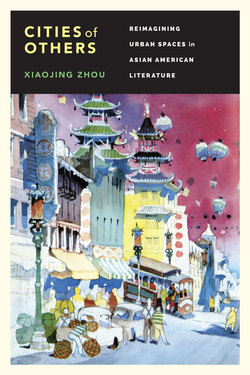Cities of Others

Реклама. ООО «ЛитРес», ИНН: 7719571260.
Оглавление
Xiaojing Zhou. Cities of Others
CONTENTS
Отрывок из книги
THE SCOTT AND LAURIE OKI SERIES IN ASIAN AMERICAN STUDIES
From a Three-Cornered World: New and Selected Poems by James Masao Mitsui
.....
In “Conclusion: The I-Hotel and Other Places,” I seek to further extend the conceptual and critical framework for reading Asian American city literature and for “thinking radical democracy spatially” (Massey’s phrase in “Thinking” 283). Given the diverse, heterogeneous histories, experience, and narrative strategies of Asian American writers, it is especially necessary to keep “our critical geographical imagination” open to “redefinition and expansion in new directions,” to borrow the phrases of Patricia Yaeger (15). I contend that to renew “our intellectual apparatus” in order to expand “our ethical and imaginative engagements,” as Yaeger urges in her introduction to the special topic on cities for a 2007 issue of PMLA (15), more critical attention must be given to city literature by minority American writers. Asian American writings about urban space offer incisive theorizing perspectives on metropolises, global cities, transnational ethnic enclaves, and inner-city ghettos. As a way of overcoming the thematic and methodological limitations in my reading of Asian American city literature, I include Yamashita’s I Hotel (2010) and lê thi diem thúy’s The Gangster We Are All Looking For (2004). My brief discussion of these two novels is also intended to call critical attention to the politics and poetics of space embedded in their respective narrative strategies in order to further open up the conceptual and historical frameworks for studying urban literature. If Yamashita’s novel shows how the I-Hotel became a catalytic site of grassroots community activism for human rights and housing rights, for racial and spatial justice, and thus demonstrates the transformative agency of the marginalized Others in shaping the history and geography of the city, thúy’s novel testifies to the legacy of U.S. imperialism and the social, cultural marginalization of Vietnam War refugees in American society. By depicting the trauma of the refugees, who bear witness to the destruction visited by the U.S. military on Viet Nam and in whose memories its disappeared forests, landscapes, and way of life exist, thúy, like Yamashita, embeds in the urban geography of the United States the “visions and voices” of those who are transforming the cultural and political geography of the American city and nation-space.
Critics of literature and photography of urban exploration often emphasize the classed and gendered privilege of visual observation. John Urry in his essay “City Life and the Senses” examines the social and cultural conditions that have contributed to placing the visual “at the top” of the “hierarchy of sense within Western culture over the past few centuries” (389). The assumed superiority of the visual, Urry suggests, resides in its potential for the seeing subject to possess and control what is seen. “The visual sense enables people to take possession, not only of other people, but also of diverse environments. It enables the world to be controlled at a distance, combining detachment and mastery” (389–90). Such a possessive and controlling gaze, Urry notes, is the privilege of the upper and middle classes, who have the power to mediate urban spatial organizations in such a way as to reinforce social hierarchy and regulate social interactions (390–91). Other critics contend that such visual privilege and power characterize the male gaze. Elizabeth Wilson, for example, in her essay “The Invisible Flâneur,” included in the volume Postmodern Cities and Spaces (1995), notes that the flâneur, “as a man who takes visual possession of the city,” “has emerged in postmodern feminist discourse as the embodiment of the ‘male gaze’” (65). Exploring further the implications of the classed and gendered gaze of the flâneur, Judith Walkowitz states, “The fact and fantasy of urban exploration had long been an informing feature of nineteenth-century bourgeois male subjectivity” (410). Moreover, Walkowitz suggests that while the bourgeois male subject is in part constituted by the urban investigation as a way of knowing and mastery of the urban scene, he plays a significant role in constructing the urban geography and communities. As early as the mid-nineteenth century, “urban explorers adapted the language of imperialism” and “emulated the privileged gaze of anthropology” that “transformed the unexplored territory of the London poor into an alien place” and represented “the poor as a race apart, outside the national community” (412–13).
.....